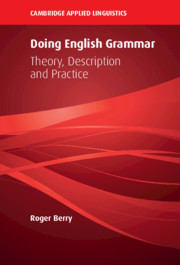Book contents
- Doing English Grammar
- The Cambridge Applied Linguistics Series
- Doing English Grammar
- Copyright page
- Contents
- Figure
- Tables
- Editors’ Preface
- Introduction
- 1 The Place of Grammar
- 2 What Is Grammar?
- 3 The Need for New Descriptions
- 4 Working with Terminology
- 5 Issues in Grammatical Description
- 6 Grammar in Operation
- 7 Case Study 1
- 8 Case Study 2
- 9 Case Study 3
- 10 Case Study 4
- Conclusion
- Appendices
- Index
- References
10 - Case Study 4
Reported Speech
Published online by Cambridge University Press: 02 March 2021
- Doing English Grammar
- The Cambridge Applied Linguistics Series
- Doing English Grammar
- Copyright page
- Contents
- Figure
- Tables
- Editors’ Preface
- Introduction
- 1 The Place of Grammar
- 2 What Is Grammar?
- 3 The Need for New Descriptions
- 4 Working with Terminology
- 5 Issues in Grammatical Description
- 6 Grammar in Operation
- 7 Case Study 1
- 8 Case Study 2
- 9 Case Study 3
- 10 Case Study 4
- Conclusion
- Appendices
- Index
- References
Summary
The final case study examines critically an established topic in the grammatical canon: direct and reported speech. The extensive use of rules of ‘backshift’ (e.g. ‘change the past tense to the present’) to support this is rejected as a pedagogic fiction, not only because it is well-known that these ‘rules’ do not always apply. An explanation is offered for cases where tense does appear to ‘change’: to ‘distance’ the speaker from a commitment to the original speaker’s proposition (which explains why the past rarely ‘changes’ to the past perfect – the distance is already there). Beyond this there are grounds for rejecting completely the linking of direct and reported speech. Usually when something is reported it is not the actual text that is reported (with the ordained changes) but the meaning; if the actual words are important and remembered then direct speech will be used. It is therefore wrong to present the two as alternatives, and to expect learners to transform one into the other. Once this is accepted, other areas to do with reporting can be promoted, such as the structures used with reporting verbs (e.g. ‘I explained to him…’).
- Type
- Chapter
- Information
- Doing English GrammarTheory, Description and Practice, pp. 209 - 225Publisher: Cambridge University PressPrint publication year: 2021

